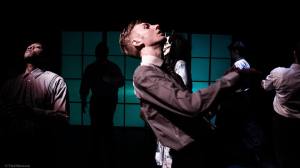Paulette Randall has recently “claimed that she felt “pigeonholed” because people expect her to only direct black work. She admitted she feared not getting jobs if she suggested directing non-black work. And I fully appreciate where she is coming from, as being a director from a minority background I, too, feel pigeonholed and have to fight hard to not let myself always be put into the same old box, in my case, the ‘Latin-American/Brazilian director.’
Last year I saw a few Brazilian theatre productions on the British stage. This included Companhia Mundana’s adaptation of The Duel by Anton Chekhov and My Uncle’s Shoes by Companhia do Meu Tio at the Edinburgh Fringe Festival; a series of short plays featuring playwrights Newton Moreno and Jô Bilac presented by Theatre 503; StoneCrabs’ production Kitchen, a new play by Gael Le Cornec, and the capoeira-inspired show Play Low and Long Haul. All explored a variety of themes, authors, aesthetics, but all featured Brazilian artists, some living in the UK and some not and the common ground that critics and programmers considered them all quintessentially ‘Brazilian’.
I am often criticised if I am not spending more time creating ‘Brazilian’ theatre, which makes me ask, ‘What is Brazilian theatre?’ Does it describe plays written by Brazilians? Plays with Brazilian themes? Plays about Brazilians? Or a combination of all these things? Must I be always directing or creating Brazilian work?
I have directed plays by Brazilian and British writers which cover Brazilian themes or about Brazilians – but, interestingly enough, very few have actually been recognised as Brazilian work and the fact that I am a director from Brazil, doesn’t seem to be enough to classify the work as Brazilian.
As a theatre director born in Brazil, am I not, by default, creating Brazilian work? Or must I revert myself to the use of the Brazilian popular and native folkloric references or collaborate exclusively with Brazilian playwrights in order to be considered an ‘authentic’ Brazilian director?
There have been wonderful discussions about my work and how I merge techniques from various cultures on stage. I used Butoh [a form of Japanese dance] techniques when I directed Waltz #6 by Nelson Rodrigues (2005) and for my production of Asphalt Kiss, also by Rodrigues (2012) I made use of German expressionism. Asphalt Kiss also included Brazilian music by Caetano Veloso and Nana Caymmi but despite this at a post-show discussion, I found myself being questioned as to why I hadn’t supposedly use Brazilian music. Someone else asked why I insisted on using an international cast with various accents in my productions and another described my work as ‘world performance’. Personally, I was flattered by the different expectations and opinions from different audience members. I know of other Brazilian directors who also use similar methods to create their work. Theatre director André Pink, for instance, is known for using Commedia Dell’arte techniques when creating some of his work.
Brazil is home to such a blended culture, and as such, it gives me the freedom to embrace other heritages and theatre techniques. For instance, Bahia (the Brazilian state where I am from) has a large community of people of West African heritage, which in turn has influenced lots of the cultural aspects of Brazil. This subconsciously influenced my productions of Queen Pokou by Dean Atta and The Burial by Nigerian playwright Bola Agbaje in 2013. I have also collaborated with a Japanese company, and when we developed The Damask Drum by Mishima, we used Brazilian music, Japanese movement and worked with an international cast that included Brazilians. However, these productions were not considered to be ‘Brazilian’. When I staged the works of Brazilian playwrights like Nelson Rodrigues, Antonio Bivar, Plinio Marcos, Augusto Boal and Leilah Assunção in London, both as a producer and director, the recognition of Brazilian Theatre quickly came pouring in.

David Lee-Jones and Laya Martí in the production of Skin in Flames at Park Theatre, photo by Andrew H Williams, 2015.
There is no denying that Brazilian theatre is a hybrid form, despite the many cultural movements, which tried to rescue the ‘Brazilian’ identity such as Nova Dramaturgia Brasileira. And I feel that there is much more to gain than lose from this ingrained multiculturalism found in our historical background.
By working with an international cast I am trying to break forms and conventions. By telling stories, either Brazilian or non-Brazilian, we are sharing knowledge and discoveries.
The choices I make stem not from nationality but from a search for humanism. I want to create theatre (be it in small or large scale) that tells stories and engages people at every level – not just in their minds but in their emotions, values and imaginations. If we want to be the drivers of real change we must learn to tell, and listen to, a new set of stories about the world we want to create.
My work is a hybrid. I am a Brazilian artist who uses aesthetics to create work that is visually exciting and challenging. I am interested in stories of the diaspora created by world artists like myself.
I have just finished working on Skin in Flames for both StoneCrabs Theatre and Bots and Barrals at Park Theatre with an international company of actors; this is a Spanish Catalan political thriller in which the writer is not specific on which country the drama is happening. It could easily be set in any place that has suffered war and conflict. To many it doesn’t matter, but others criticise the fact that they cannot place neither the play nor the work in a simple box.
As a Brazilian living away from home, I am interested in creating theatre beyond borders: global theatre made local. Does that take Brazil out of my work?
You can see Franko Figueiredo’s current work at Park Theatre until 6 June.
This post was originally published with www.brasilobserver.co.uk


